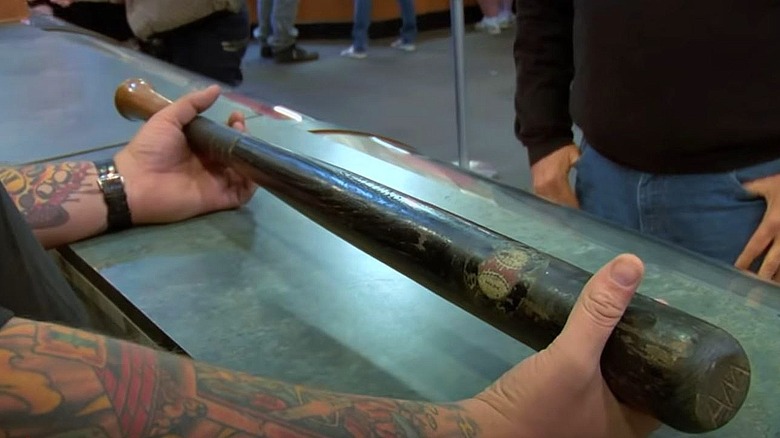The Joe Jackson Bat That Sold For Hundreds On Pawn Stars
"Shoeless Joe" Jackson is without question one of the most fascinating players in Major League Baseball history. Of course, there was his stellar play on the field, but there was also a scandal that derailed the Chicago White Sox outfielder's career while he was still in his prime.
In perhaps one of the biggest cases of alleged cheating that the MLB has ever known, Jackson was embroiled in the infamous Black Sox Scandal (via the New York Times). It happened in 1919, when eight players from the Chicago ball club were accused of conspiring to fix the World Series and lose the championship to the Cincinnati Reds in exchange for a payoff of $5,000 apiece from infamous gambling syndicate boss Arnold Rothstein. While the players were acquitted in a public trial, in 1921, Judge Kenesaw Mountain Landis delivered a crushing blow to the accused as the first commissioner of Major League Baseball by banning all eight players from the game for life.
As a result, a mystique was created around the disgraced player. Debates about Jackson's ban among baseball luminaries — and movies like "Eight Men Out" and "Field of Dreams" — have kept his name in the public conversation to this day. As such, any memorabilia tied to Jackson is extremely valuable when it surfaces, and generally yields a tidy profit for sellers in venues like Rick Harrison's World Famous Gold & Silver Shop featured on History's hit series "Pawn Stars."
The Black Betsy replica
Since Joe Jackson had a record 12 hits for the White Sox in the series with the Reds — a high-water mark that held until 1964 — baseball historians have continually been engaged in discussion about the player's level of guilt in the Black Sox controversy, and whether the ban on Jackson, who died in 1951 at age 64, should be lifted posthumously (via Greenville News).
During Jackson's 12-year MLB career — where he played for Philadelphia and Cleveland's clubs before he moved on to Chicago — the left-handed hitter had an impressive .356 batting average, with 1,772 hits, 54 home runs, and 785 runs batted in, according to Baseball Reference. Much of the success Jackson had in the batter's box came with a bat he dubbed "Black Betsy," which was examined on an episode of "Pawn Stars."
In a Season 5 episode of "Pawn Stars," a prospective seller named Charles presented "Pawn Stars" employees Corey Harrison and Austin "Chumlee" Russell with a nearly 100-year-old replica of Black Betsy made by Spaulding, which he purchased after finding it in "a pile of junk" at a garage sale. "It kind of spoke to me," Charles told Corey and Chumlee. In the pawn shop, Charles wanted to turn his intuition into a $300 payday.
Pawn Stars showed that even replicas can be valuable
Before figuring out if the Black Betsy replica was the real deal and carried any value, Corey shared some interesting factoids about Jackson, including the origin of his nickname "Shoeless Joe." As it turns out, Jackson only went shoeless in one game in his career, because the spikes in his cleats were poking through the soles of his shoes so bad "that his feet were bleeding." As a result, Corey explained, Jackson called time out, pulled off his cleats, and finished the game in his bare feet.
Since pieces of sports memorabilia are among "the most commonly faked items out there," Corey said, he called in a "Pawn Stars" expert: Jeremy, the owner of Ultimate Sports Cards & Memorabilia, to determine the authenticity of the replica bat. As it turns out, even replicas of Jackson items are valuable since the hitter had the third-highest batting average in MLB history behind Ty Cobb and Rogers Hornsby.
"He was so good that actually, Babe Ruth modeled his stance after him, and regarded him as the best hitter he'd ever seen," Jeremy noted, adding that the original Black Betsy bat — which a fan carved out of hickory wood and stained with tobacco juice — sold for nearly $600,000.
While vintage replicas of Black Betsy only sell for a fraction of the cost of the original, they still can be "extremely collectible" and are "truly an amazing find," Jeremy said. Examining the "condition issues" of the replica, he noted the wear the bat's decals had incurred, as well the letters "AM" carved on the top (presumably by the original owner) as factors in determining its. However, since the bat had real "Spaulding" markings and met dimension and size requirements, Jeremy determined Black Betsy replica was an authentic store model bat sold from anywhere between 1915 to 1920. He valued the bat at $800.
Playfully admitting that there are times where "calling in a buddy" ended costing him more money, Corey asked Charles if the $300 offer was still doable. Empowered by the bat's higher value, though, the prospective seller upped his asking price to $400. However, since Corey convinced Charles that the pawn shop was in business to make profits off the items they buy for resale, they met in the middle and Corey purchased the bat for $350.
"I'm really glad that the expert showed up because I'm walking out with more money that way," Charles said.


